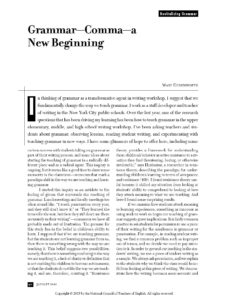Author: Mary Ehrenworth
Summary: Teaching grammar through inquiry and seduction? In this piece, Mary Ehrenworth shares strategies for moving away from direct instruction (which seldom works) to making it possible for students to “have an apprenticeship relation with great authors, even at the sentence structure level.” By honoring diverse dialects and helping students make intentional choices through inquiry (How DO authors choose verb tense?), teaching grammar becomes an integral part of the composing process. Examples of student work illuminate the effectiveness of this approach and make this article useful for workshop leaders and teachers seeking fresh approaches for teaching grammar within the context of student writing.
Original Date of Publication: January 2003
Excerpt:
How closely Jenny models her own writing on Nabokov’s sentence structure, and how much power that gives her writing! Like Nabokov, she has implied a history within the parentheses. She has told the reader something about her mother and something about herself. She has set a tone that is slightly distant, slightly wry, that suggests the world and her place in it. She has punctuated accurately as well. Jenny was able, without further instruction, to see how powerful this sentence is. It leaps off the page. This moment demonstrated several things to us. It took the teaching out of my hands and moved it from direct instruction to the idea that students have an apprenticeship relation with great authors, even at the level of sentence structure. It showed students what it is like to be in a relationship with the ideas and language of literature. It gave Jenny, and the class when we shared it, a whole new idea of the purpose of grammar. It suggested grammar as inquiry and as craft.
Related Resources
- Grammar, Grammars and the Teaching of Grammar
- Honoring Dialect and Culture: Pathways to Student Success on High-Stakes Writing Assessments
Original Source: National Writing Project, https://www.nwp.org/cs/public/print/resource/4703
